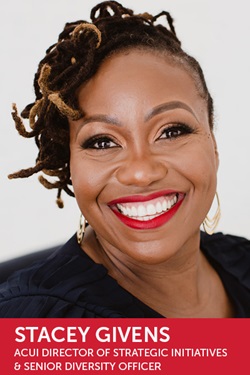Moving On Up: The Benefits of Career Ladders for Volunteers and Student Unions
As “help needed” signs seem to pop up on the doors of every business imaginable, many student unions — often dependent on volunteers, let alone paid employees — are wondering how to make ends meet.
One way to tackle the problem is to encourage growth from within. That’s where career ladders come in. These formal development paths allow student and professional employees to climb through progressively higher “rungs,” or levels of career advancement.
The best part? In addition to helping attract and retain employees, career ladders provide individuals with a golden opportunity to build skills, competencies, and bridges to future jobs. We spoke with Stacey Givens, director of ACUI’s Strategic Initiatives and senior diversity officer, about her personal experience reaping the benefits of career ladders — as well as tips for building them.
MOVING UP THE CAREER LADDER: BENEFITS FOR VOLUNTEERS
Givens told us her experience as a volunteer in the corporate world helped her build her skill set and advance to where she is today. In a past project management role, she offered to lead an employee resource group, a responsibility that included building a team of volunteers.
“I have been a project manager for decades, but the task of creating a volunteer team from scratch was new to me,” Givens said. “I was upskilling my abilities as a project manager to lead a speed networking event for 100 employees and more than 20 executives. By accepting the volunteer assignment (in addition to my day job), I added a valuable skill to my tool belt.”
In another scenario, Givens accepted a request to join a board in her city. The experience taught her about board governance, structure, and engagement — all of which helped prepare her for her current role.
“The key to all of this is saying ‘yes’ when asked to volunteer and knowing what that role will add to your tool kit as preparation for your next assignment,” Givens said. “If your goal is to learn fundraising, but your background is in marketing, volunteer to take on a fundraising task. Pushing past my comfort zone has helped me build new skills and enhance current skills for new assignments.”
Givens also recommended that student and professional employees take on stretch assignments, or opportunities to grow beyond their current positions. Imagine the first rung of a career ladder is a project coordinator role in which you manage incoming work. Your goal should be to take on an assignment with an adjacent group, such as the team that sends the work to the project coordinator.
“That way, you learn the rung next to you as well as your own,” Givens said. “The key is to ask for the opportunity. In today’s environment, most teams are understaffed, and leaders would welcome a student who says, ‘I have experience as a project coordinator, and I have the bandwidth to serve your team — how can I help?’ I’ve never met a manager who would turn down someone who takes that initiative and an extra set of hands.”

Students and professionals can also obtain stretch assignments by applying skills they already possess in an all-new arena.
“If you’re great at building presentations for your current role, you can offer to build presentations for a department you’re interested in working with,” Givens said. “The presentation content — and the people you will work with — will provide you access to an area of campus that you might not have experienced had you not offered your expertise.”
BUILDING YOUR LADDER: TIPS FOR STUDENT UNIONS
As a student union leader, building a career ladder for students and professionals helps them identify possible career paths and make intentional decisions. Givens recommends that student unions start with a list of roles in their particular area, from entry-level to seasoned professional.
“Map out the progression from one rung to the next (where each rung is a role) by defining the skills needed to demonstrate capability and proficiency at each level,” she said. “These could include leadership, presentation, database management, written communication, or knowledge of particular systems or software, among other skills.”
Be sure to highlight skills that volunteers will most likely acquire on the job, systems they will learn to operate, and potential networking opportunities. Next, detail the benefits they will receive in exchange for their efforts, such as stipends, recommendation letters and endorsements, or promotions. These parameters allow volunteers to be strategic in how and where they donate their time.
“What they are learning, who they gain access to, and the systems they learn to operate with a level of confidence are not trivial,” Givens said. “These on-the-job skills can be added to resumes, and endorsements can become bridges to new careers.”
VOLUNTEER OPPORTUNITIES WITHIN ACUI
If you’re looking for opportunities to gain new skills, check out ACUI’s volunteer page. Multiple positions are available, from regional conference planners and conference program chairs to roles focused on Diversity, Equity, and Inclusion (DEI).
“We are looking for willing hearts and hands who will partner with us,” Givens said. “If you can only give five hours a month, we understand, and you are welcome! We will maximize your time and ensure there is mutual benefit to your experience volunteering and serving with us.”

